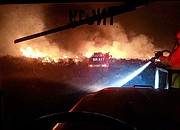Dream comes true for volunteer firefighter
MATTAWA - Growing up, Hector Gonzalez knew he wanted to be a firefighter. At age 18 he began the active pursuit of making that dream come true as a volunteer for Grant County District No. 8.
"I always wanted to be a firefighter. What a great place to work on my career," Gonzalez said.
According to Gonzalez, there are three pathways he could've taken in pursuing his career goal of being a full-time paid firefighter. The first is the Candidate Physical Ability Test (CPAT), the second is attending a fire fighting academy and the third one is to become a volunteer.
Of the three options, Gonzalez said volunteering appealed to him the most because of the real-life experience he would gain right out of the gate after initial training.
"In an academy the training is similar, but the burns are controlled," he said. "As a volunteer the fires are not controlled."
Gonzalez tries to get as much experience as he can and responds to as many calls as possible. However, he also works security at a data center in Quincy, a 45-minute drive from Mattawa, which can make it difficult to respond to calls.
When Gonzalez initially joined the department as a volunteer a year and seven months ago, he attended two long training meetings. He said the first thing he had to learn was the basics of fire and how it can affect different structures and situations.
Training is on-going. Volunteers learn about structure fires, car fires, extrications, and medical training for those who want to be an EMT.
"More knowledge and experience is great. We are always training and learning new techniques and more about fire science," Gonzalez said. "We learn about the different ways a fire can destroy and ways we can help stop it. We need to know where a fire is going and set up our equipment to fight it best."
Becoming an EMT is the next step for Gonzalez on his journey toward full-time paid firefighter. According to Fire Chief Dave Patterson, the department will hold EMT training this year, hopefully this spring or fall. The classes require 160 hours of in-class training after passing background checks and pre-training tests.
However, Chief Patterson said that while he may not be an EMT yet, Gonzalez does contribute a lot to the calls requiring primarily medical aid.
"Hector helps us as a translator, runs traffic, whatever is needed," Patterson said.
Gonzalez wants to learn as much as he can during his time as a volunteer and feels that this department is the best place to do that. He credits all the members of the department, especially Chief Patterson , with helping him achieve his goal.
"I enjoy working with the chief. He's great at what he does," Gonzalez said.
One of the toughest days in Gonzalez's short volunteer career was this past summer during wildfire season. The day started off with ropes training followed by a call around 8 p.m. to a structure fire that took around two hours to extinguish.
Gonzalez said the crew was cleaning the hoses used at the structure fire when the call came into to head out to Hanford to assist with a wildfire. It was a Sunday evening when they headed out, and he returned home around 7 p.m. the next night.
"It was the biggest fire I've ever been in. It was indescribable, but we were successful in the area we were assigned." Gonzalez said. "It was an amazing experience to see the fire planes flying overhead dropping retardant."
The department has several vehicles which are used, depending on the type of call it receives. There are two brush trucks, which are used for wildfires, such as the one Gonzalez assisted with in the summer.
Two firefighters work from these trucks, one is a driver and the other works from the cage, which is suspended in front of the truck. Another truck which is used for fighting fires around the local area seats five, and Gonzalez said that where a person sits in the truck depends on the role he or she will play on the call.
The three in the back seat set up the hydrant, run the hose and handle tools needed for the call. The driver also operates the pump on the truck, while the fifth passenger, usually the captain, is the safety officer, which Gonzalez said is a vital part of a fire call.
"If we aren't safe, we get hurt , and then who will put out the fire?" Gonzalez asked rhetorically. "They (safety officer) look around the scene for possible threats to us and alert us to them."
Hector is one of the younger volunteers with the department According to Patterson, that is a good thing for the longevity of his career path.
"Nationwide the life expectancy of a firefighter career is five years because most join at 40 or 50 years old. It's good to get them young like Hector because they will last longer," Patterson said.
And they are still as excited as a kid about being a firefighter.



